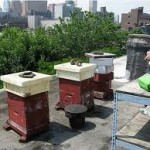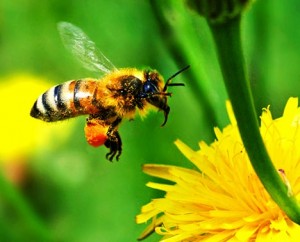 It is possible to keep bees almost anywhere including cities and towns and in fact beekeepers often find that honey production is better in an urban setting than a rural setting, as there are often more varied flora for bees to be found in urban gardens. However those wishing to keep bees in a city or town should check with their local authorities first as there are still some who do not permit urban beekeeping.
It is possible to keep bees almost anywhere including cities and towns and in fact beekeepers often find that honey production is better in an urban setting than a rural setting, as there are often more varied flora for bees to be found in urban gardens. However those wishing to keep bees in a city or town should check with their local authorities first as there are still some who do not permit urban beekeeping.
Once you are satisfied that you are allowed to keep bees it is important to take certain precautions to ensure that your bee hives do not become a nuisance to those living nearby.
Bee colony temperament
First of all it is important that you only keep bee colonies with gentle temperaments, so only purchase bees that have been bred for gentleness. If your bees sting a lot or are aggressive and follow you after the hives are closed up you should requeen as soon as possible as this will usually change the temperament of the bee colony within four to five weeks.
Water source for the bees
You should provide a source of water near to the bee hives as this will prevent the bees looking for a source in the neighbours pool, bird bath or hanging laundry. This can be a real problem, as once bees have become accustomed to a watering source, they will continue to use it in large numbers throughout the season and it is almost impossible to stop without moving the bee colony some distance.
Locating an urban bee hive
With a basic understanding of bee behaviour it is possible to locate your beehives so as to ensure they cause no problems to the people and animals around them. For example most bee colonies have a basic flight pattern as they leave and return to the hive. So it is important to ensure that people walking by are not likely to be within this pattern. Always ensure if possible that the beehives are not facing walkways or paths, children’s play areas or others gardens. In addition bees tend to release their body waste soon after leaving the hive so consideration should be given to spotting of laundry or cars underneath, especially if you are intending to keep several colonies of bees.
Bees will tend to fly straight out of a hive and ascend slowly if they can, so a good way of controlling their flight pattern is to build a fence or locate the hive opening towards a hedge, ideally this should be at least 6 feet high which will force the bees to fly above head level and thus reduces the chance of encounters with pedestrians. Fences and hedges also keep colonies out of view, which will help reduce theft or vandalism and also out of sight out of mind may be better for those more nervous neighbours.
Good bee colony management
When opening and inspecting your bee hives in an urban setting, you must think about the welfare of those around you. The weather and time of day influence the mood of a colony, just as bee colonies kept in the shade tend to be more defensive. Ideally you should inspect your bee hives on warm, sunny days, between the hours of 10 a.m to 4 p.m when most of the flying workers will be out foraging.
You should always use a well-lit smoker properly to control the bees and help prevent defensive behaviour. During a nectar dearth, keep robbing at a minimum as robbing stimulates defensive behavior. Keep examination time to a minimum and make sure honey supers and frames not being inspected are covered. All spare equipment stored outside should be bee-tight.
Swarming bees can be a major concern for neighbours. Even though swarming bees are quite gentle and seldom inclined to sting, the presence of a swarm in the neighborhood tends to worry people and your apiary, rightly or wrongly, will likely be seen as the source of the swarm. Having sufficient equipment to manage your colonies and reduce swarming is a must (see our Swarm Management section).
Part of being an urban beekeeper is good public relations and beekeepers who allow their bees to become nuisances force communities to bring in banning orders which spoils it for everyone else. Exercise proper control and management of your bees and never keep more colonies, than the available forage in the area can support or more than you have time to care for properly. Sweeten the neighbours with the occasional jar of honey or if they are interested let them see inside one of your hives. Follow these guidelines and you and everyone else arround you will be able to enjoy your urban beekeeping.

